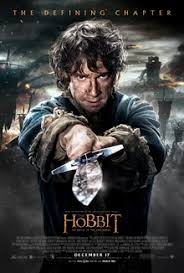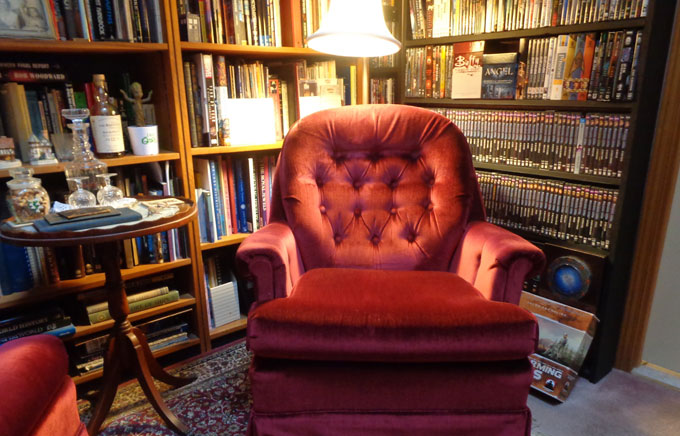
Bilbo and the Dwarves watch in horror from Erebor’s Lonely Mountain as the dragon Smaug rains fire down upon Laketown. Bard (Luke Evans), with his son’s help, mans the great bow with the last black arrow and fires it into the one vulnerable spot in Smaug’s armor. The Master of Laketown (Stephen Fry) and his gang, escaping in a boat full of gold, are crushed by Smaug’s falling body. I am reminded of the pre-credit action scenes in the Bond movies—now that we’ve dazzled you, let the story begin. Bard becomes the leader of Laketown as they seek refuge in the ruins of Dale, next to the Mountain. Legolas (Orlando Bloom) and Tauriel (Evangeline Lilly) go off to investigate Mount Gundabad. Thorin (Richard Armitage) has Dragon Sickness and is overcome with greed, searching fanatically for the Arkenstone, which Bilbo is hiding. As the Laketown survivors flood in, Thorin orders the entrance to the Lonely Mountain sealed off, putting up a wall to keep the migrants out.
Galadriel (Cate Blanchett), Elrond (Hugo Weaving), and Saruman (Christopher Lee) arrive at Dol Guldur and free Gandalf. As Galadriel heals him, the others battle the Nazgul Wraiths and Sauron, banishing him to the East. Without the ring, they believe, he cannot return. In the book, Gandalf disappears now and then and returns with a story; in the movies, we are shown where he went and what happened. Azog the Defiler (Manu Bennett), marching on Erebor with a huge Orc army, sends his son Bolg (Conan Stevens) to Gundabad to command the second army. Legolas and Tauriel watch from hiding as thousands of Orcs, Berserkers, and giant bats go by.
King Thranduil (Lee Pace), riding an elk with eight-foot antlers, accompanied by an army of Elves—their precision marching is incredible—arrive in Dale and align with Bard to reclaim the part of the treasure that is theirs. Bard asks Thorin for what he had promised the people of Laketown, but he refuses. Gandalf arrives at Dale to warn Bard and Thranduil of the Orcs’ coming, but Thranduil arrogantly dismisses the warning. Bilbo sneaks out of Erebor and hands the Arkenstone over to Thranduil and Bard, hoping they can trade it for the treasure that is theirs and prevent a war. Thorin refuses to believe they have the Arkenstone and when Bilbo admits that he took it, he calls this theft and betrayal and nearly kills Bilbo, until Gandalf shames him into releasing the Hobbit.
Thorin’s cousin Dain (Billy Connolly), riding a huge pig, arrives with a Dwarf army, and a battle of elves and dwarves begins, until giant Were Worms burst out of the ground, having dug tunnels to transport Azog’s army. The Dwarves and Elves stop fighting each other and begin to battle the Orcs. But a second front opens with more Orcs pouring into the valley, along with Ogres and Trolls. They attack Dale, forcing Bard to withdraw his troops to defend the city. In the book, Bilbo pretty much hides out while the Battle of the Five Armies rages; Peter Jackson creates a whole movie out of it.
Inside Erebor, Thorin’s Dragon Sickness breaks with hallucinations. He regains his sanity and leads his company out to join the battle, encouraging the other dwarves. Azog is directing his troops with flags atop Ravenhill, and Thorin, with Dwalin, Fili and Kili, charge the hill on the backs of huge mountain sheep to, as Gandalf puts it, cut the head off the snake. The drama switches from clashing armies to mano a mano battles. Bilbo follows the dwarves, invisible with his ring. Tauriel and Legolas arrive to warn the Dwarves of the approach of Bolg’s army, see the struggle on Raven hill, and join in. Fili is captured and Azog kills him as Bilbo and the dwarves watch helplessly. Thorin engages in a fight to the death with Azog. Bolg knocks Bilbo out, overpowers Tauriel, and then kills Kili, who came to her aid.
Legolas battles Bolg and kills him. Thorin kills Azog after a vicious fight but is fatally wounded. The last of the Five Armies—the Great Eagles—appears, plucking the giant bats out of the skies and the Orcs from the battlefield. Beorn (Mikael Persbrandt) is riding one and leaps to the ground, becoming a huge bear as he falls, and wreaks havoc among the Orcs. The Orc army is defeated, and its leadership is dead.
Bilbo regains consciousness and reconciles with the dying Thorin, the Dwarves approach and mourn their leader. Tauriel mourns Kili, and Thranduil acknowledges their love as real. Legolas tells Thranduil that he cannot return to the Woods, and Thranduil advises him to head north and seek out a human ranger named Strider. Dain is now King under the Mountain, and the Dwarves settle into Erebor. Dale begins to recover with Bard in charge. The Dwarves say farewell to Bilbo, and he heads for the Shire with Gandalf. At the parting of the ways, Gandalf tells Bilbo he knows about the ring and warns him to be careful. Bilbo says he lost it and Gandalf believes not a word. Bilbo returns to Bag End to find himself declared dead and his furniture being auctioned off. He cancels the sale and stands in his empty house, holding the ring. Sixty years later, Bilbo is visited by Gandalf on his 111th birthday.
I know the Hobbit trilogy has serious problems, but I can’t actively dislike a movie after enjoying it so much. I have seen plenty of bad movies, with clanging dialogue spoken by uninspired actors in long boring passages, badly cut, and obviously made for the money by everybody involved, with no affection for the source or respect for the audience. As Roger Ebert said, “That’s two hours of my life I’ll never get back.” It seems that Jackson was trying to turn the Hobbit into Lord of the Rings, to catch lightning in the bottle twice. As a result, he threw in all kinds of stuff the story didn’t really need, but filmmakers do that all the time. It’s called the Director’s Cut, and it has all the scenes the director hated to cut out of the theater version. Do you like that? A lot depends on how much you enjoyed those scenes. Gandalf, Giant Eagles, Bilbo vs. Gollum, Orcs on Wargs, incendiary Dragons with the voice of Benedict Cumberbatch, gorgeous Elves in formation, the landscape of New Zealand—I love that shit. It’s like the movies I saw at the drive-in in the Fifties, but believable. Some of the greatest literature in the world has been treated by movie studios with criminal negligence, but this doesn’t seem like one to me.
